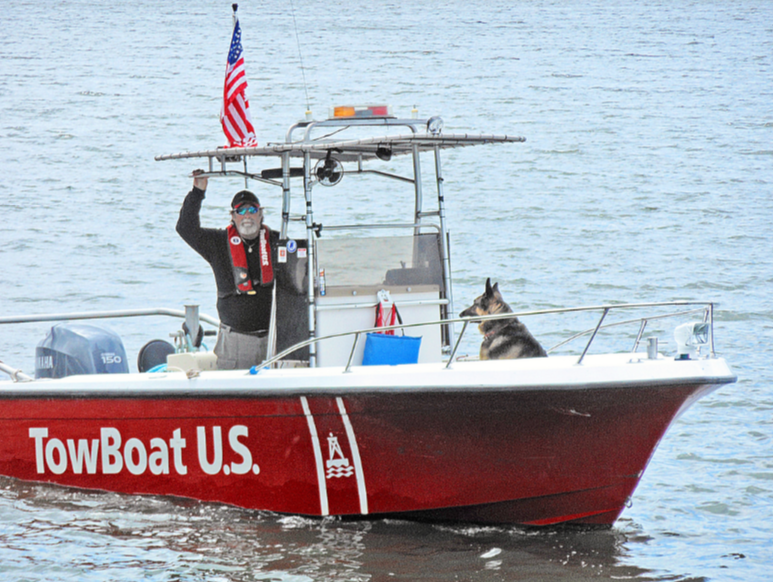Getting a Tow
If you’ve been boating long enough, getting a tow is inevitable – particularly with a power boat.
Our first tow experience was when motoring in our sailboat out of Back Creek Annapolis on our way to Nantucket, when the water impeller threw a blade and blocked the seawater cooling, which then caused the seawater muffler to overheat and crack, sending an alarming looking cloud of smoke out the companionway!
Fortunately, it was a Saturday and we were still in the Severn River just off the old Spider. Ham Gale’s TowBoat U.S. was nearby and had us back in our slip in time to run to the marine supply store for replacement parts.
We were ready to begin our 700 mile cruise again in 2 hours.
The second occasion was a few years later when we ran our sailboat out of fuel at 2 AM between Block Island and Montauk. It was peaceful enough to float and wait for the wind to fill, but we could see thunder storms approaching from the Northwest, it was too deep to anchor and the Race was ripping causing our boat to do pirouettes in the swift current.
It had been a longer motor than expected from Cape May with no wind. TowBoat U. S. never sleeps, and the Point Judith operator ran five gallons out to us. We purged the air and she fired right up, but the tow boat operator nearly insisted on towing us, which was totally not necessary. Never-the-less he “led” us into Point Judith, where I grew up sailing at Camp Fuller– and knew quite well – even to find our way to the Harbor of Refuge anchorage in the dark.
The third occasion was when our 20’ Shamrock power boat overheated while we were chasing the Volvo Ocean Racers down the Bay. That was a long and humiliating ride home.
The fourth occasion was when I ran the Shamrock out of fuel under the Chesapeake Bay Bridge at about 11 PM. No tow necessary, just another 5 gallons courtesy of Ham Gale’s TowBoat U. S.
Thank goodness for Boat U.S. towing insurance and their tolerance!
The fifth time was again between Block Island and Montauk. This time, we were on our way to Nantucket when the weather turned against us and 30 – 40 knots of wind came directly on the nose off Long Island. We decided that instead of tacking all the way to Nantucket and getting the crap beat out of us, we’d put into BI. We were motoring in the Block Island Channel past SW Ledge at 2 AM in 90’ of water when our rudder snagged a lobster pot. The biggest difference between crab pots and lobster pots is weight. We just couldn’t free ourselves. The TowBoat U. S. operator on the Block sleeps with his cell phone on and he was there in 40 minutes. He claimed on the phone to have a rope cutter on a long pole, but despite the clear water he just could not see the line. The current was ripping through the Race. He would not get into the water and neither would I. He was concerned about the sharks that are known to hang around SW Ledge. And so was I. We were essentially anchored by the stern in a 4’ sea. Despite being in the lee of the Block, it was an untenable situation. So we accepted a tow. Within 10 minutes, the line broke but we did not want to spin the prop not knowing how much line might be left on the rudder. The tow operator brought us to a mooring and offered to come back in the morning to clear the line – for $200 not covered by our towing insurance. We thanked him and declined the dive service, deciding to spend the money eating out in Nantucket. Next morning I pulled a foot of line off the rudder in 72 degree water that was so clear that you could see the bottom in 15’.
And then there were the 3 times we ran our sailboat aground and couldn’t get ourselves off. Once off Cape Cod and twice in the Chesapeake. We were able to free ourselves all of the other times. Fortunately, they were all soft groundings that caused no damage. Just humiliation.
I blame ALL of these incidents on my navigator, loran or GPS.
Well…in any case, that’s my story and I’m sticking to it.
A Friend recently said, “Gee – I’ve never been towed and I’ve been boating all my life. I must not be boating aggressively enough.” Generous of him. But he’s unusually resourceful and patient.
One day, I’ll enjoy telling him about the few tows that we did manage to avoid. Those make for even better stories than the tows – and there are fewer of them.
Let’s go sailing!
Let’s go sailing!

